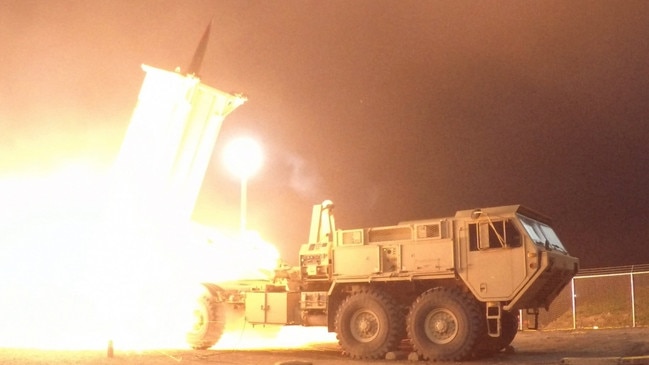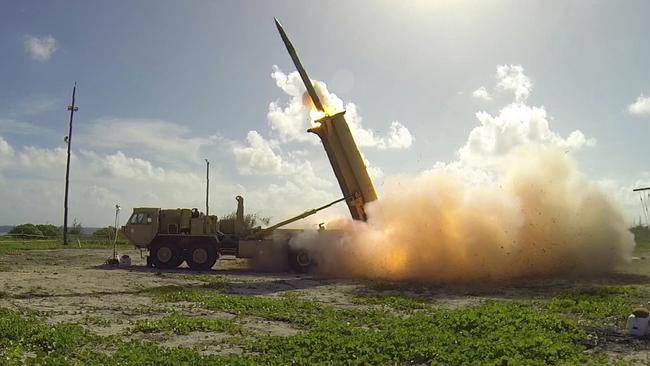US sends advanced antimissile system to Israel to bolster defences
The deployment of the advanced THAAD system, designed to shoot down ballistic missiles, is a significant step in US efforts to directly protect Israel by putting troops on the ground.

The Biden administration is sending an advanced antimissile system to Israel along with American troops to operate it, moving to bolster its top Middle East ally’s defences against an Iranian attack, the Pentagon said Sunday.
The deployment of the THAAD system, a ground-based interceptor designed to shoot down ballistic missiles, marks a significant step in American efforts to directly protect Israel against an enemy attack by putting US soldiers on the ground.
The move comes as US and Israeli officials have been holding talks on a planned Israeli strike on Iran. US officials have urged Prime Minister Benjamin Netanyahu’s government not to target Iran’s oil facilities and nuclear sites.
President Biden’s decision to approve the deployment came after extensive discussions among US officials and with Israel over the country’s expected military response to Iran and how Tehran might retaliate.
At the direction of the President, Secretary Austin authorized the deployment of a Terminal High-Altitude Area Defense (THAAD) battery and associated crew of U.S. military personnel to Israel to help bolster Israel's air defenses following Iran's unprecedented attacks against… pic.twitter.com/P2FJVaOqIt
— U.S. Central Command (@CENTCOM) October 13, 2024
The decision to send the antimissile system wasn’t specifically conditioned on Israel avoiding certain more provocative targets. But it was “part of a broader discussion on how to handle the situation,” according to a senior US official.
The move to send US forces to Israel is a visible demonstration of the Biden administration’s support for Israel a month before the presidential election, a rare US deployment to Israel. Like Biden, Vice President Kamala Harris has emphasised her support for protecting Israel, calling her support for Israel’s security “unwavering” earlier this month.
American officials say that the deployment of the THAAD will augment Israel’s antimissile defence against a sizeable Iranian missile threat and give the US more flexibility in deploying its ballistic missile defence destroyers.
THAAD stands for Terminal High Altitude Area Defence and is operated by the US Army. A typical THAAD battery is crewed by nearly 100 soldiers and consists of six truck mounted launchers, a transportable radar and a fire control unit.
The Pentagon has announced the Immediate Deployment of a Terminal High Altitude Area Defense (THAAD) Battery operated by U.S. Soldiers to Israel, in order to Bolster Israeli Defenses against any Future Attack by Iran using Ballistic Missiles. pic.twitter.com/TxJtSbemin
— OSINTdefender (@sentdefender) October 13, 2024
It is designed to intercept missiles inside or outside the atmosphere during the final phase of flight, according to the Congressional Research Service. A THAAD system purchased by the United Arab Emirates intercepted a Houthi missile in January 2022, marking the first time that the system has been used successfully in combat.
If Iran responded to the planned Israeli strike with an attack on Israel, it would be the third instance of Tehran hitting Israeli territory this year.
How quickly the Pentagon can move the system to Israel wasn’t immediately clear. The administration didn’t say when the THAAD would be in place.
In a statement Sunday, the Pentagon said Defence Secretary Lloyd Austin had ordered the antimissile system to Israel at Biden’s direction “following Iran’s unprecedented attacks against Israel on April 13 and again on October 1.” The statement added: “This action underscores the United States’ iron-clad commitment to the defence of Israel, and to defend Americans in Israel, from any further ballistic missile attacks by Iran.” The US decision comes after Iran shot roughly 180 ballistic missiles into Israel in response to an Israeli air strike that killed Hezbollah leader Hassan Nasrallah.
Some of the missiles, which targeted Israeli military and intelligence sites, penetrated Israel’s antimissile defences, raising fears that should Iran attack again, it might inflict serious damage. Iran’s Oct. 1 strikes led to minor damage at one Israeli military air base, but no aircraft were damaged.
US warships in the Mediterranean shot down ballistic missiles when Iran attacked Israel in April and earlier this month. The US used F-15E and F-16 warplanes to intercept Iranian drones during Iran’s April attack.
The THAAD would provide a ground-based defence in Israel, deepening American involvement in its defence.
“THAAD has been proven in combat operationally and has a great test record,” said Tom Karako, an expert on missile defence at the Center for Strategic and International Studies think tank in Washington. “It would provide additional capabilities.”

The US temporarily sent a THAAD missile defence battery in 2019 to Israel as part of an exercise that the US military said demonstrated Washington’s “continued commitment to Israel’s regional security.” Israeli news reports over the weekend said the US was considering sending the system but that no decision had been made.
Shortly after the Hamas-led attacks on Oct. 7 last year that Israeli authorities say killed 1,200 people, the Pentagon sent additional air defence systems throughout the Middle East to protect US troops who came under increased attacks by Iranian-proxy forces. In January three US troops in Jordan were killed during a drone attack on their base. Another 40 were injured.
Israel has become increasingly dependent on the US military to bolster its defences against Iran’s sizeable missile threat and that of the militant groups Tehran supports. The deployment of US ships, planes and personnel has been intended to head off an all-out war in the region. But it has strained American military efforts to tackle threats from Russia and China, particularly its future ship deployment plans.
During the Persian Gulf War in 1991, US troops sent Patriot antimissile batteries to Israel, which were operated by American and Israeli crews, to defend the country against Iraq’s Scud missiles.
Dow Jones





To join the conversation, please log in. Don't have an account? Register
Join the conversation, you are commenting as Logout